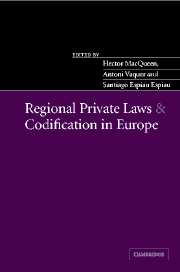Book contents
- Frontmatter
- Contents
- List of contributors
- Acknowledgements
- List of abbreviations
- Introduction
- 1 The civil law in European codes
- 2 ‘A token of independence’: debates on the history and development of Scots law
- 3 The Scottish civil code project
- 4 Scots law in Europe: the case of contract
- 5 Scottish property: a system of Civilian principle. But could it be codified?
- 6 ‘… Quae ad ius Cathalanicum pertinet’: the civil law of Catalonia, ius commune and the legal tradition
- 7 The codification of Catalan civil law
- 8 Unification of the European law of obligations and codification of Catalan civil law
- 9 From revocation to non-opposability: modern developments of the Paulian action
- 10 Epistle to Catalonia: romance and rentabilidad in an anglophone mixed jurisdiction
- 11 Estonia and the new civil law
- 12 The positive experience of the Civil Code of Quebec in the North American common law environment
- 13 From the code civil du bas Canada (1866) to the code civil Quebecois (1991), or from the consolidation to the reform of the law: a reflection for Catalonia
- 14 The evolution of the Greek civil law: from its Roman–Byzantine origins to its contemporary European orientation
- Index
2 - ‘A token of independence’: debates on the history and development of Scots law
Published online by Cambridge University Press: 30 July 2009
- Frontmatter
- Contents
- List of contributors
- Acknowledgements
- List of abbreviations
- Introduction
- 1 The civil law in European codes
- 2 ‘A token of independence’: debates on the history and development of Scots law
- 3 The Scottish civil code project
- 4 Scots law in Europe: the case of contract
- 5 Scottish property: a system of Civilian principle. But could it be codified?
- 6 ‘… Quae ad ius Cathalanicum pertinet’: the civil law of Catalonia, ius commune and the legal tradition
- 7 The codification of Catalan civil law
- 8 Unification of the European law of obligations and codification of Catalan civil law
- 9 From revocation to non-opposability: modern developments of the Paulian action
- 10 Epistle to Catalonia: romance and rentabilidad in an anglophone mixed jurisdiction
- 11 Estonia and the new civil law
- 12 The positive experience of the Civil Code of Quebec in the North American common law environment
- 13 From the code civil du bas Canada (1866) to the code civil Quebecois (1991), or from the consolidation to the reform of the law: a reflection for Catalonia
- 14 The evolution of the Greek civil law: from its Roman–Byzantine origins to its contemporary European orientation
- Index
Summary
Introduction
This chapter briefly explores current debates on five aspects of Scots law, namely:
(a) the revision of the ‘legal nationalist’ history of Scottish private law;
(b) the devolution of legislative power over Scots law to a Scottish Parliament;
(c) the Scottish approach towards ideas of European integration or harmonisation;
(d) the place of Scots law within the Civilian–Common Law dichotomy; and
(e) the future direction of development of Scots law.
A sixth debate, on ‘what should be the main vehicle of reform – judicial development, statutory reform or codification?’, is excluded since it is considered by Professor Clive's chapter. Criminal law and public law are also excluded.
The United Kingdom: ‘parts’ and regions
The United Kingdom is divided into three ‘parts’ each with its own independent system of law and structure of courts, namely (1) England and Wales, which form one part; (2) Scotland; and (3) Northern Ireland. It is English law that applies within England and Wales: nobody ever talks of Anglo-Welsh law. In the United Kingdom English law is in theory equal in status to Scots law, but in the British colonies it was always English law that was introduced, which thereby became the imperial law.
The debate about revision of the ‘legal nationalist’ history of scots law
The debate about the true nature of Scots law and its relationship with the English common law and Continental civilian traditions is bound up with the writing of Scottish legal history, to the dismay of those academically correct historians who would like to keep legal history as a safe (and perhaps even rather dull) discipline immune from modern ideological concerns.
- Type
- Chapter
- Information
- Regional Private Laws and Codification in Europe , pp. 60 - 82Publisher: Cambridge University PressPrint publication year: 2003



